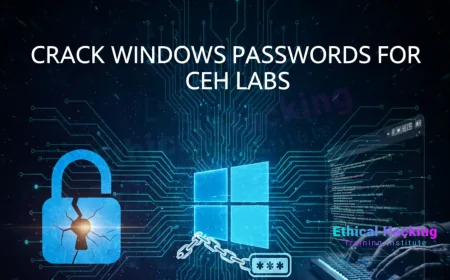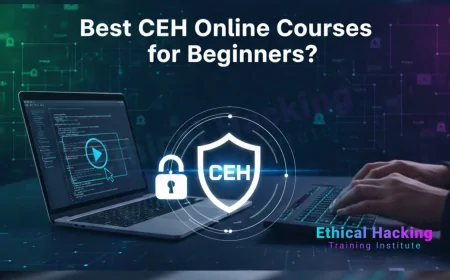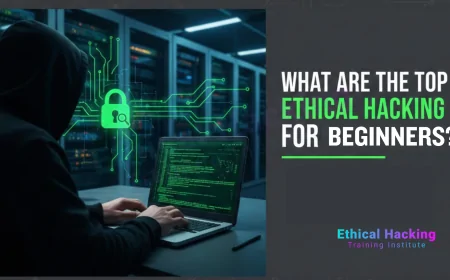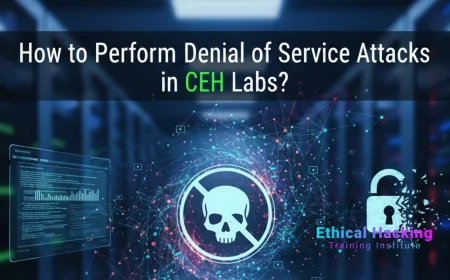CEH Course Overview: What You’ll Learn and Why It’s Essential | Why CEH Certification is Vital: Course Content and Industry Relevance
Explore this detailed CEH course overview to learn what ethical hacking skills you'll gain, the topics covered in CEH certification, why it's essential in cybersecurity, and how it benefits your career.
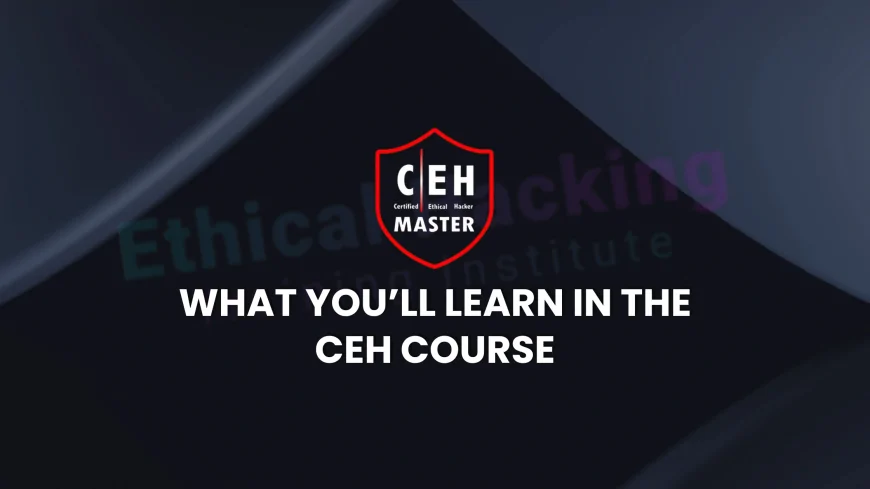
Table of Contents
- Introduction
- What is CEH?
- Why CEH Matters in Cybersecurity
- CEH Course Outline
- Key Skills You’ll Learn
- Top Tools Covered in CEH
- Hands-on Labs & Real-World Practice
- Certification Exam Details
- Career Benefits of CEH Certification
- Who Should Take the CEH Course?
- Prerequisites for CEH
- Training Modes: Online vs Offline
- Cost and Duration of CEH Course
- Top CEH Training Providers in India
- Is CEH Worth It?
- Global Recognition of CEH
- Next Steps After CEH
- FAQs
- Conclusion
CEH Course Overview: What You’ll Learn and Why It’s
Essential
Certified Ethical Hacker (CEH) is more than just a cybersecurity course; it's a career-transforming qualification. In today’s era of digital transformation, the threats to data and systems have grown exponentially. The CEH certification by EC-Council equips cybersecurity professionals with the tools, mindset, and methodologies hackers use—legally and ethically—to protect networks and systems.
This guide offers a comprehensive overview of what the CEH course teaches, why it's considered essential, and how it shapes your cybersecurity career.
What is CEH?
The CEH (Certified Ethical Hacker), awarded by EC-Council, is one of the most recognized cybersecurity certifications internationally. It is designed to validate the skills of professionals in identifying system vulnerabilities using the same techniques as malicious hackers—but in a legal and authorized way.
CEH empowers professionals with skills in:
-
Vulnerability assessment
-
Penetration testing
-
Reconnaissance
-
Malware threats
-
Social engineering
Why CEH Matters in Cybersecurity
In an age where cyberattacks are rising daily, ethical hackers play a vital role in safeguarding digital ecosystems. Organizations prefer CEH-certified professionals because:
-
They understand hacker thinking (aka hacker mindset)
-
They follow structured methodologies
-
They use industry-standard tools
-
They can detect and prevent security breaches proactively
CEH Course Outline
The CEH v12/v11 curriculum is updated to meet modern threat landscapes. Here’s what the course typically covers:
-
Introduction to Ethical Hacking
-
Footprinting and Reconnaissance
-
Scanning Networks
-
Enumeration
-
Vulnerability Analysis
-
System Hacking
-
Malware Threats
-
Sniffing
-
Social Engineering
-
Denial-of-Service (DoS)
-
Session Hijacking
-
Evading IDS, Firewalls, and Honeypots
-
Hacking Web Servers and Web Applications
-
SQL Injection
-
Hacking Wireless Networks
-
Hacking Mobile Platforms
-
IoT and OT Hacking
-
Cloud Computing
-
Cryptography
Key Skills You’ll Learn
-
Footprinting and reconnaissance
-
Network scanning and enumeration
-
System hacking and privilege escalation
-
Trojans, backdoors, and malware analysis
-
Wireless and IoT hacking
-
Web application exploitation
-
Cryptographic techniques
-
Cloud security principles
Top Tools Covered in CEH
CEH exposes you to a broad suite of 350+ tools used in ethical hacking, for example:
-
Nmap – network mapping
-
Metasploit – exploit development
-
Wireshark – packet analysis
-
Burp Suite – web vulnerability scanner
-
John the Ripper – password cracking
-
Aircrack-ng – wireless attacks
-
Nikto – web server scanner
-
Acunetix – vulnerability scanning
Hands-on Labs & Real-World Practice
CEH emphasizes real-world simulation environments:
-
Cloud-based iLabs for practice
-
Red team vs. blue team scenarios
-
Simulated attacks and defenses
-
Capture the Flag (CTF) challenges
These labs give learners the confidence to face real security threats.
Certification Exam Details
Exam Code: 312-50 (ANSI)
Format: Multiple Choice
Duration: 4 Hours
Questions: 125
Passing Score: 60% to 85% (depending on the test form)
Proctoring: Pearson VUE/EC-Council ATC/Remote
Career Benefits of CEH Certification
-
Globally recognized credential
-
Enables entry into cybersecurity roles such as Ethical Hacker, Red Team Specialist, and more.
-
Helps achieve compliance with industry standards (e.g., ISO 27001, GDPR)
-
High salary potential (₹6 LPA to ₹25+ LPA in India)
-
Strengthens professional credibility
Who Should Take the CEH Course?
-
Network Security Engineers
-
System Administrators
-
Penetration Testers
-
Risk Management Experts
-
Cybersecurity Students
-
Security Enthusiasts & Career Changers
Prerequisites for CEH
While CEH is beginner-friendly, it's ideal to have:
-
Basic knowledge of networking
-
Familiarity with Windows/Linux OS
-
Understanding of TCP/IP
-
Preferably, applicants should have two or more years of experience in IT or cybersecurity roles.
Alternatively, EC-Council’s EC-Council Training waives off the experience requirement.
Training Modes: Online vs Offline
-
Self-Paced Online: 24/7 access, flexible learning
-
Instructor-Led Live Classes: Interactive, real-time sessions
-
In-Person (Classroom): Traditional coaching at EC-Council ATCs
-
Hybrid Programs: Combination of online + offline
Cost and Duration of CEH Course
-
Duration: 40–60 hours of training
-
Exam Cost: ~$1,199 (varies by location)
-
Training Fee (India): ₹25,000 – ₹65,000 depending on mode/provider
Top CEH Training Providers in India
WebAsha Technologies – Pune
-
Website: www.webasha.com
-
Courses Offered: CEH v12, CEH Practical, CHFI, and cybersecurity bootcamps.
-
Features:
-
EC-Council Accredited Training Partner
-
Live Instructor-Led + Self-Paced Options
-
Real-World Labs with iLabs Access
-
Exam Voucher Included
-
Placement Assistance & Career Counseling
-
1-on-1 Mentorship Support
-
Why Choose WebAsha for CEH Training?
-
EC-Council Accredited Training Center
-
Trainers with 5–10 Years of Industry Experience
-
100% Practical Labs & iLabs Integration
-
Custom Batch Schedules for Working Professionals
-
EMI Options for Fees & Corporate Discounts
Is CEH Worth It?
Yes. If you're aiming to enter the cybersecurity domain, CEH is one of the best first certifications. It proves:
-
Ethical hacking competence
-
Awareness of hacking tools and techniques
-
Commitment to legal cybersecurity practice
Global Recognition of CEH
CEH is recognized by:
-
NSA (National Security Agency)
-
DoD (Department of Defense)
-
ANSI (American National Standards Institute)
-
UK GCHQ and CREST-aligned orgs
Next Steps After CEH
After CEH, you can specialize in:
-
CEH (Practical) – hands-on, performance-based
-
CHFI – forensics
-
CND – defense
-
ECSA – advanced penetration testing
-
LPT (Master) – elite level penetration tester
FAQs
1. What is CEH certification?
The CEH certification validates ethical hacking skills and is offered by EC-Council.
2. Who can apply for CEH?
Anyone with basic IT knowledge can apply. Recommended: 2 years of security experience or EC-Council training.
3. How much does CEH cost in India?
Between ₹25,000 – ₹65,000 depending on training provider.
4. What is the validity of CEH?
CEH certification is valid for 3 years, after which recertification is required.
5. What is the CEH exam duration?
The CEH exam lasts for 4 hours.
6. Is CEH enough to get a job?
Yes, it opens roles like ethical hacker, penetration tester, and security analyst.
7. How is CEH different from CompTIA Security+?
CEH focuses on offensive security; Security+ is more general and defensive.
8. Does CEH include practical labs?
Yes, through EC-Council’s iLabs or third-party platforms.
9. What tools are used in CEH training?
Tools like Nmap, Wireshark, Metasploit, Burp Suite, and more.
10. Can I take CEH without experience?
Yes, if you take EC-Council-approved training.
11. Is CEH available online?
Yes, in both self-paced and instructor-led formats.
12. What is CEH Practical?
A hands-on, performance-based test taken after CEH Theory.
13. What is the salary after CEH in India?
₹6 to ₹25+ LPA depending on experience and role.
14. How many questions are in the CEH exam?
125 multiple-choice questions.
15. How often is the CEH updated?
Every 2–3 years to reflect evolving cyber threats (latest is v12).
16. Is CEH recognized globally?
Yes, by NSA, DoD, and several international bodies.
17. Is CEH good for beginners?
Yes, especially those with basic networking knowledge.
18. Can CEH be done after 12th?
Yes, but some IT knowledge or foundational course is recommended.
19. How long does it take to complete CEH?
Typically 4 to 6 weeks with regular study.
20. Is CEH enough for ethical hacking?
It's a strong foundation. Advanced roles require further certifications like ECSA or LPT.
Conclusion
The Certified Ethical Hacker (CEH) course is your gateway to becoming a trusted cybersecurity professional. It’s more than a certificate—it's a skillset that empowers you to secure networks, prevent attacks, and ethically hack systems before criminals do.
Whether you're an IT professional, a student, or a career switcher, CEH equips you with globally relevant tools, lab experience, and theoretical depth that translates into real-world cyber resilience.
What's Your Reaction?
 Like
0
Like
0
 Dislike
0
Dislike
0
 Love
0
Love
0
 Funny
0
Funny
0
 Angry
0
Angry
0
 Sad
0
Sad
0
 Wow
0
Wow
0






